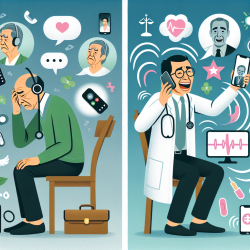Introduction
In Nigeria, a country with a population of over 200 million, mental health services are severely under-resourced. With only seven government-owned psychiatric facilities and fewer than 150 psychiatrists, the need for innovative solutions in mental health care is urgent. The research article "Community Psychiatry Care: An Urgent Need in Nigeria" by Soroye et al. highlights the critical need for a shift from hospital-based psychiatric care to a community-based multidisciplinary approach.
Understanding the Challenges
The burden of mental health disorders in Nigeria is significant, with one in four Nigerians affected by mental illness. The stigma associated with mental health issues exacerbates the problem, preventing many from seeking help. This stigma is deeply rooted in cultural beliefs and myths that view mental illness as a spiritual attack or a consequence of wrongdoing.
The lack of trained professionals and resources further complicates the situation. In comparison, the United States has about 28,000 psychiatrists for a population of 330 million, while Nigeria has less than 150 for its 200 million citizens. This disparity underscores the need for a community-based approach that leverages existing resources more effectively.
Implementing Community-Based Psychiatry
The research suggests several strategies for practitioners to enhance their skills and contribute to a more effective mental health care system in Nigeria:
- Integrate Mental Health into Primary Care: By incorporating psychiatric care into primary healthcare services, practitioners can provide early assessment and treatment for less severe disorders, while offering ongoing care for more severe cases.
- Form Multidisciplinary Teams: Establish teams that include psychiatrists, psychologists, nurses, social workers, and other healthcare professionals to provide comprehensive care.
- Community Engagement: Engage with community and religious leaders to reduce stigma and promote mental health awareness. This grassroots approach can foster social acceptance and support for individuals with mental illness.
- Education and Training: Train primary healthcare workers to recognize early signs of mental illness and provide basic mental health education to the community.
- Leverage Technology: Strengthen online and remote mental health services to increase accessibility and continuity of care.
Encouraging Further Research
Practitioners are encouraged to delve deeper into the research and explore innovative solutions tailored to the Nigerian context. Collaboration with international organizations and local NGOs, such as Mentally Aware Nigeria Initiative (MANI), can provide valuable insights and resources.
Further research is needed to evaluate the effectiveness of community-based psychiatry models and develop policies that align with international standards. This includes revising the outdated Mental Health Policy of 1991 and ensuring adequate government funding and support for mental health initiatives.
Conclusion
Transitioning to a community-based psychiatric care model in Nigeria is not just an option but a necessity. By implementing the strategies outlined in the research, practitioners can play a pivotal role in transforming mental health care in Nigeria. This shift will not only improve access to care but also reduce stigma, enhance quality of life, and provide essential support to individuals and their families.
To read the original research paper, please follow this link: Community Psychiatry Care: An Urgent Need in Nigeria.










